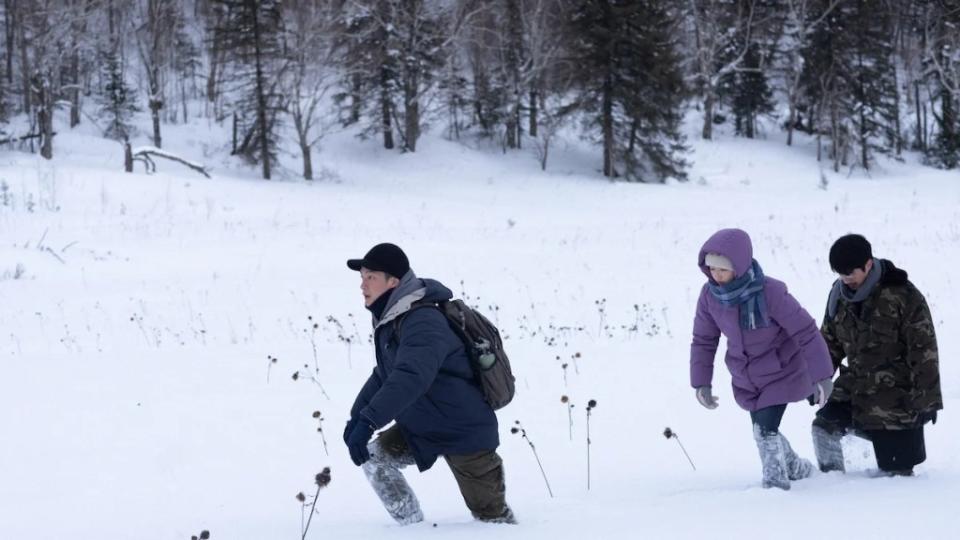How an Existential Crisis Led to Singaporean Oscar Entry ‘The Breaking Ice’
- Oops!Something went wrong.Please try again later.
Films from director Anthony Chen have represented Singapore three times at the Oscars. After “Ilo Ilo” in 2013 and “Wet Season” in 2020, he’s back with “The Breaking Ice,” a lovely, light-on-its-feet drama in which a melancholy young man from Singapore falls into an unlikely relationship with a tour guide and her boyfriend in a frigid Chinese town near the North Korean border.
What was the impetus for this film?
To be honest, I had a real existential crisis during the pandemic when cinemas closed and film production stopped. I thought this is the beginning of the end, you know? And when you’re stuck, you look to find a new direction. I’m a control freak, but I wanted to free myself, which is why instead of making all the decisions and having this very detailed blueprint, which is what I did before, I allowed myself to discover things.
I wrote most of the script in the city in northeast China where we shot, and I was allowing what I saw, what I discovered, what I experienced to make its way into the script. I didn’t have a finished script until 10 days before we started shooting, and there was a certain freeing energy in this film which one probably would have never seen in my previous works.
Did the actors have a sense of who they were going to be playing and what they were going to be doing?
No. They flew into the city 10 days before production started. They flew in at 3, and their managers were texting my producer going, “You know, it’d be nice if Anthony shared the script before they land.” But I finished the script at 10 a.m. that day, and my entire team was furiously photocopying the scripts. We had a table read at 7 p.m., and everyone read it for the first time then — the actors, the heads of departments, the DP, the producers … No one knew what to expect. And at the end, I remember the DP turned to me and said, “This is actually quite moving and poetic and beautiful.” (Laughs)
Truffaut’s “Jules and Jim” was an influence, wasn’t it?
I think that was a little bit of a starting point. I read so many articles about young people during the pandemic, about how they feel lost and stuck in life, and let down by the previous generation and the government and society. I felt this collective melancholia — and because I was having this existential crisis during the pandemic, I connected with the melancholy and wanted to capture this feeling in a film.
But I’ve never made a film about young people, so I was thinking, where do you start? I kept thinking, what is that one film that captured the spirit of youth? And the first film that came into my head was “Jules and Jim.” I saw it as a film student and every couple of years since then. I didn’t go, “OK, I’m gonna rewatch this film, I’m gonna study this film.” But I remembered that spirit and and how freeing it felt — and because the film had two boys and a girl, I decided, I’m gonna write a film about two boys and a girl.
As the title suggests, the film’s central metaphor is ice. Where did that come from?
That came very early when I knew I wanted to shoot the film in winter. I’m from Singapore. I grew up in a tropical sort of summery country, and I told the producer, “We’re gonna go to the coldest place in China.” But I didn’t just want to be shooting in the snow, because I feel like snow has been shot so many times. So I kept thinking about the process of how ice forms. Water freezes into ice, but when you take out this ice and put it on a surface, it almost instantaneously starts melting, and in a few hours it’s back into water. It feels so quick and transient. And I wanted to use this feeling to describe this relationship of three people bonding and developing this complex relationship over a very short time. But that melts very quickly as well, and what’s left is the memory.
The film is filled with striking images, from people skating on a frozen lake at night to the animals in a zoo in the pre-dawn hours. Did you discover those places while you were scouting or shooting?
Some of it came when I was writing the script in the city and doing an early location scout. For example, I was looking for an apartment, and the producer and I had time between appointments with real estate agents. I said, “Look, there’s a park next door — shall we take a look at how the local people live?” And instead of finding people, I found animals in the park. I saw all these monkeys and deer, and it felt so surreal. I decided, OK, instead of shooting this in daytime, I’m going to write this into a night scene — a quite dreamy, almost magical realist scene.
I allowed things to fall into the film. For example, I wanted the third act to end in a more wide-open, natural landscape. I felt that they needed to leave the urban environment and go back to a certain purity. And I discovered this mountain called the Shanghai Mountain, of which half is in North Korea and half is in China. My producer and I hiked up the mountain and saw Heaven Lake, and it felt like a soul-cleansing moment for me. And I was like, “I need to shoot this.”

What was the biggest challenge of the shoot itself?
Well, it was cold. We were shooting in minus 20, minus 30 degrees. I realized that when it’s cold, you just put on more clothes. It’s the first time I’ve shopped so much on the internet. I was wrapping myself in all sorts of stuff and I was not very prepared. My feet and my shoes were wet all the time. But I don’t think it was that hard, because you just put on layers.
In fact, whenever we were shooting outdoors, my observation was that the actors just get into the rhythm and hit the marks very quickly. It was so cold that if we were shooting the third or fourth take, their faces would be so frozen they couldn’t express much emotion anymore. So whenever we were shooting outdoors, they seemed to be so on the ball.
What was harder was was the interior scenes. There were some very complex, intimate scenes. When I was writing those scenes, I was enjoying myself so much. I was thinking, if we can realize this, it would be so amazing. But I wasn’t even sure if the young actors would be able to step up to it. And in the end, they delivered it. My favorite scene in the film is actually the shower scene in the third act. As I was writing it, I was very moved by it. And when the actors were doing it, I was moved to tears.
That is one of the most striking scenes in the movie, because the actors are separated by a shower curtain.
This is a Chinese film, right? (Filmed in China with largely Chinese characters.) And with a Chinese film, you always have to deal with censorship. I knew from the start, it’s not a French film and you’re not gonna have nudity. Everything had to be done with restraint. And interestingly, I think this film pushed into places that I’ve never gone before. I was like, I’m gonna write this intimate, almost very sensual erotic scene, but very bittersweet as well. And the bodies are completely separated by the shower curtain and would never touch.
We think of China as one of the most restrictive countries in the world, but I found the most freedom in a place with all that restriction, because I was pushed to think out of the box, to find new ways of expressing very complex feelings.
A version of this story first appeared in the International Feature Film issue of TheWrap’s awards magazine. Read more from the issue here.

The post How an Existential Crisis Led to Singaporean Oscar Entry ‘The Breaking Ice’ appeared first on TheWrap.

